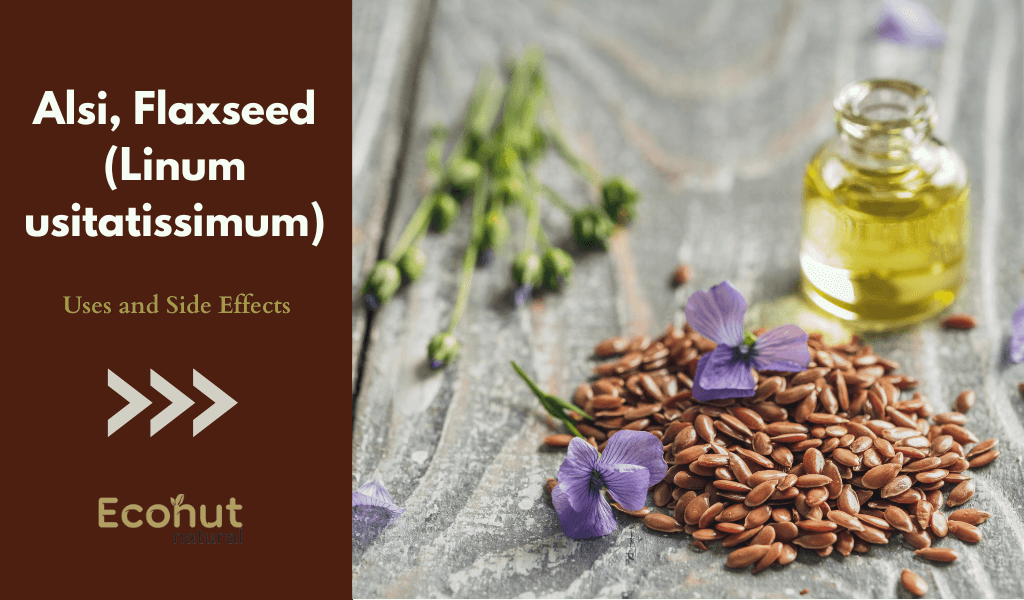Flaxseed, also known as Alsi or Linum usitatissimum, is a versatile and nutrient-packed seed that has been consumed for thousands of years.
Discription
Alsi, also known as flaxseed (Linum usitatissimum), is a versatile and nutrient-rich seed that has been cultivated for centuries for its culinary, medicinal, and industrial uses. The discription of this plant are below.
Flowers:
Flax produces delicate, pale blue to sky-blue flowers that are around 1 inch (2.5 cm) in diameter. These flowers have five petals and are borne at the tips of slender stems.
Fruit:
After the flowers are pollinated, they develop into small, round seed capsules called bolls. Each boll contains several small, shiny, brown or golden-brown seeds.
Leaves:
Flax plants have slender, lance-shaped leaves that are alternate and arranged spirally along the stems. The leaves are about 1 to 1.5 inches long.
Plant Type:
Flax (Linum usitatissimum) is an annual plant belonging to the Linaceae family.
Height:
It typically grows to a height of about 1 to 3 feet (30 to 90 cm).
Common Names
English name: Linseed, Flaxseed
Hindi name: Alsi, Alasi, Teesi
Sanskrit name: Atasi, Neempushpi, Alasi, Kshuma, picchala, Neela, Neelapushpin
Alsi Bengali name: Marshina
Marathi Name: Javasu
Arabic Name: Kattan
Gujarati: Alasi
Telugu name: Alasi, Atasi, Bittu
Scientific Classification of Alasi
| Kingdom | Plantae |
| Class | Dicotyledons |
| Subclass | Polypetalae |
| Series | Disciflorae |
| Order | Geraniales |
| Family | Linaceae |
| Genus | Linum |
| Species | Usitatissimum |
Alasi Ayurvedic Properties
| Rasa (Taste) | Madhura (sweet) Tikat (bitter) |
| Guna (Virtue) | Guru (heavy) Snigdha (oily), Picchaa (slimy) |
| Virya (potency) | Ushana (hot potency) |
| Vipaka (post – digestion) | Katu (pungent) |
Benefits of Alsi, Flaxseed (Linum usitatissimum)
Flaxseeds, also known as Alsi or Linum usitatissimum, are tiny seeds packed with a range of health benefits. Here are discuss benefits regarding Alsi, Flaxseed (Linum usitatissimum):
Rich in Nutrients:
Flaxseeds are loaded with nutrients, including omega-3 fatty acids, lignans (plant compounds with antioxidant properties), and fiber. They are a good source of vitamins and minerals like thiamine, copper, manganese, and magnesium.
Cancer Prevention:
Some studies suggest that the lignans in flaxseeds may have protective effects against certain types of cancer, particularly breast, prostate, and colon cancer. Lignans have antioxidant properties that help neutralize harmful free radicals.
Makes Healthy Skin and Hair:
This herb contain The omega-3 fatty acids and antioxidants in flaxseeds can contribute to healthy skin by reducing inflammation and promoting hydration. These nutrients may also benefit hair health, making it stronger and shinier.
Control Blood Sugar:
Medical Science suggest that flaxseeds may help improve insulin sensitivity and lower blood sugar levels, which is beneficial for those with diabetes or at risk of developing it.
Useful in Weight Management:
Flaxseeds contain fiber and healthy fats. It can help promote feelings of fullness, which may aid in weight management. Including flaxseeds in meals can help control appetite and prevent overeating.
Good Heart Health
This herb contain The omega-3 fatty acids in flaxseeds, particularly alpha-linolenic acid (ALA), are beneficial for heart health. ALA helps reduce inflammation and may lower the risk of heart disease, stroke, and high cholesterol.
Makes Good Digestive System
The Flaxseeds contain high fiberin it promotes healthy digestion and helps prevent constipation. Flaxseeds contain both soluble and insoluble fiber, which can aid in maintaining regular bowel movements.
Immune System Booster:
Flaxseeds contain Proteins and amino acids like Arginine, Aspartic acid and Glutamic acid. These amino acids were found to protect our body from a variety of fungal Infections, thus improving our overall immunity.
Reduces Risk of Stroke:
Flaxseeds Reduction in blood pressure due to consumption of reduces the risk of stroke.
Reduces Risk of Cancer:
Plant compound, Lignans are present in Flaxseeds. As per research, Lignans were found to be effective in reducing the risk of breast cancer in women and prostate cancer in men. Flaxseeds also contain Omega-3 fatty acids and proteins in high amounts. These proteins and Omega-3 fatty acids were found to prevent the development of tumours, further reducing any risk of cancer.
Also More: Talisa Patra (Abies Webbiana)
Alsi, Flaxseed (Linum usitatissimum) Side Effects
Flaxseeds, also known as alsi or Linum usitatissimum, are generally considered safe for most people when consumed in moderation. However, like many foods and supplements, they can have side effects, especially when consumed in large amounts. Here, We are discuss some potential side effects of flaxseeds:
Effects on Digestive System:
Flaxseeds are high in fiber, both soluble and insoluble. While this is generally good for digestion, consuming large amounts of flaxseeds without enough water can lead to digestive issues such as bloating, gas, diarrhea, or constipation.
Interaction with Medicines:
This herb contain compounds called lignans, which can have estrogen-like effects. If you’re taking medications that affect hormone levels, such as birth control pills or hormone replacement therapy, consuming large amounts of flaxseeds might interfere with these medications.
Produces Allergic Reactions:
Some people may be allergic to flaxseeds. Allergic reactions can range from mild symptoms like itching and hives to more severe reactions such as difficulty breathing and anaphylaxis. If you have a known allergy to flaxseeds, it’s best to avoid them.
Omega-3 Fatty Acid Interactions:
Flaxseeds contain alpha-linolenic acid (ALA), a type of omega-3 fatty acid. While ALA is beneficial for heart health, consuming large amounts of flaxseeds alongside blood-thinning medications (like aspirin or warfarin) might increase the risk of bleeding.
Produces Cyanide:
Flaxseeds contain a small amount of cyanide compounds, which are generally harmless in small amounts. However, consuming very large quantities of flaxseeds could potentially lead to cyanide toxicity. This is extremely rare and would require consuming a huge amount of flaxseeds.
Phytoestrogens:
Flaxseeds are rich in phytoestrogens, which are plant compounds that mimic estrogen in the body. While this can have some health benefits, excessive intake of phytoestrogens may be a concern for certain individuals, especially those with hormone-sensitive conditions like breast cancer.
Conclusion
Flaxseed, scientifically known as Linum usitatissimum, stands as a powerhouse of nutrition with a myriad of health benefits. Rich in omega-3 fatty acids, lignans, and fiber, this tiny seed has been linked to improved heart health, lowered cholesterol levels, and reduced inflammation. Its versatility allows for easy incorporation into various dishes, offering a convenient way to boost one’s intake of essential nutrients.
FAQS
What are Flaxseeds?
Flaxseeds, also known as linseeds, are tiny, nutrient-dense seeds derived from the flax plant (Linum usitatissimum). They are often consumed for their nutritional benefits, including their high content of omega-3 fatty acids, lignans, and fiber.
How Much Flaxseed Should I Consume?
The general recommendation is about 1-2 tablespoons of ground flaxseeds per day, which provides a good balance of omega-3s, fiber, and lignans without going overboard.
Can Pregnant Women Consume Flaxseeds?
Flaxseeds are a source of essential nutrients during pregnancy, such as omega-3 fatty acids and fiber. However, pregnant women should consult with their healthcare provider before adding flaxseeds to their diet to ensure it’s appropriate for their individual health needs.

